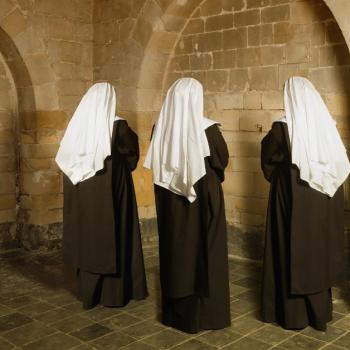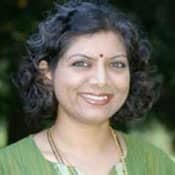NPR recently aired a show about a trio of standup comics, who are going to take a seven-city tour of India sponsored by the U.S. State Department. Initially, I felt there was a parallel to the Hindu American Foundation's "Take Back Yoga" campaign, since this "Make Chai Not War" team is a group of Indian-Americans, blending and balancing their American and Indian selves, sharing their unique combination of Western and Eastern approaches to life—but with laughter. And then I began to envy them.
"Take Back Yoga" is a campaign from the Hindu American Foundation, aiming to remind people that the underlying spiritual foundations of yoga are Hindu. Yoga, along with the Upanishads or Gita, are constantly described as "ancient Indian," yet rarely "Hindu." Yoga Journal has said that "Hinduism carries too much baggage," and many American yoga practitioners are either unaware or appalled that yoga is rooted in Hindu philosophy. As a result of trying to encourage awareness and acknowledgement—including my Patheos column over a year ago—HAF has also created some controversy. The NY Times published a front-page article in 2010, titled "Hindu Group Stirs a Debate Over Yoga's Soul," and Newsweek/Washington Post's On Faith site featured a series of articles, which became known as "The Great Yoga Debate." The latest on this yoga issue is yet another battle over lack of understanding—this time, that yoga is harmful. According to Prashant Iyengar, son of renowned yoga guru B.K.S. Iyengar, "What has spread all over the world is not yoga. It is not even non-yoga; it is un-yoga." We in the Hindu American community continue to explain yoga and all its Hindu origins, using the American ideals of advocacy, like this response from HAF's Senior Director Sheetal Shah.
"Make Chai Not War" is a uniquely Indian-American standup comedy routine, founded by Rajiv Kumar Satyal, originally from Fairfield, Ohio, and Azhar Usman of Chicago. Michael Macy, one-time attaché for the U.S. Embassy in the UK, saw comedian Azhar Usman perform, and that sowed the seeds for this tour to promote the American ideals of free speech, with messages of diversity and religious harmony. In fact, according to Macy, "This commitment to free speech, this commitment to free discussion of what can be difficult or sensitive topics, it's very American." Satyal said comedy can help bridge differences and that "it's cool to be able to go to India because that's where a lot of religious strife has been happening . . . We're not even really religious on stage. We might do some religious jokes, but it's more just bringing people together."
As someone who encourages interfaith dialogue and doing community service with people of all backgrounds to build bridges of understanding, I was envious of their lack of controversy. They made me laugh: the jokes I heard on NPR made it easy to identify with and enjoy both their Indian roots and American identities. I was also a bit frustrated with the condescending tone underlying their trip to India: that bringing the American idea of free speech to India is somehow good, whereas the Hindu concept of pluralism that one finds in India—after all, one doesn't have to be Hindu to practice yoga—isn't good enough.
But it was someone raised in NY, like me, that brought the issue back to the commonalities we share. The trio includes Hari Kondabolu of Queens, NY, who acknowledges in the NPR piece that he is as nervous as he is excited about the tour, because "so much of comedy is about cultural references and language . . . Part of what we do as comedians—or at least what I do—is to figure out where those boundaries are and see what I want to push, because I'm trying to make a point. And I don't really know where the boundaries are in another country," he says. So Hindu American advocates and Indian-American comedians all have boundaries—and some are ones we need to push, just in different ways.
1/12/2012 5:00:00 AM





